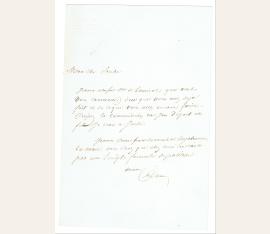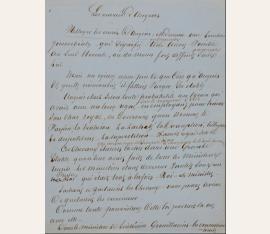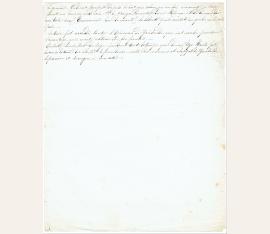French writer (1802-1870). Autograph letter signed. n. p. n. d. 8vo. 1 page.
2.500 €
(63197)
Dumas asks the French writer and librettist Eugène Scribe (1791-1861) for a favour to assist his friend Mr de Lancival. "Mon cher Scribe, Je vous adresse Mr Lancival qui veut vous remercier de ce que vous allez encore faire. Pressez la commission car son départ est fixé je crois à jeudi. Je vous serre franchement loyalement la main, vous savez c que chez moi ce n'est pas une simple formalité de politesse."
French writer (1802-1870). 2 Autograph manuscripts signed „Alex Dumas“. Naples. 4to. 10 pp. on blue paper.
6.500 €
(80370)
Two autograph manuscripts signed „Alex Dumas“ [Naples June 1862]. The two historical articles on Antiquity appeared in Italian in L'Indipendente, a Neapolitan and Garibaldian journal Dumas founded in 1861. With the newspaper Dumas supported Italian unification, before returning to Paris in 1864. In March 1861, the kingdom of Italy was proclaimed, with Victor Emmanuel II as its king. Dumas participated in the movement for Italian unification.There, he befriended Giuseppe Garibaldi, whom he had long admired and with whom he shared a commitment to liberal republican principles as well as membership within Freemasonry. The articles seem unpublished in French (L'Indipendente, 2e année, nos 35 and 38, June 27 and July 1, 1862): Antichita ’.
- Ager publicus. Caio Gracco and Cesare. They are part of a series of seven articles devoted to state property (Beni demaniali) published between June 26 and July 4, 1862. The Ager Publicus in question here are the lands annexed during the conquest of Italy and which were part of the national domain, an important stake in Roman agricultural policy.] „Ager Publicus. Caius Gracchus. Caius Gracchus, succeeding his murdered brother as tribune, made his public debut with "love at first sight for the rich." All contemporary speakers were defeated by this child opening his mouth for the first time and everyone understood that he had only tried his strength to realize what he could do […]. The people also understood it and he stopped urging the Senate to execute the agrarian law, thinking that a day would come when Caius himself would demand its execution "... Indeed, Caius continued "the social work of his brother ": cheap wheat; distribution of land; establishment of colonies; affermages; employment of the poor in public works, etc. But his absence in Carthage opens a struggle for power, brings the confrontation between aristocrats and plebeians, the death of Caius (macabre details) and three thousand men. "Thus perished the last of the Gracches struck by the hands of the nobles. But as he exhaled he threw a handful of bloody dust against the sky. From this dust was born Marius […]“ Alexandre Dumas is also known as Alexandre Dumas père (French for 'father'). His works have been translated into many languages, and he is one of the most widely read French authors. Many of his historical novels of high adventure were originally published as serials, including The Count of Monte Cristo or The Three Musketeers..
französischer Schriftsteller (1802-1870). Autograph manuscript signed „Alex Dumas“. Naples. 4to. 6 pp. on blue paper. Good condition.
7.500 €
(80371)
The autograph manuscript signed „Alex Dumas“ [Naples July 1862] is a violent attack against François II, king of the Two Sicilies, and an appeal to Garibaldi. This article appeared in Italian under the title La Stalla d'Augia (The Augean Stables) in L’Indipendente, a Neapolitan and Garibaldian journal by Alexandre Dumas (2nd year, no. 61, July 30, 1862, chronicle dated July 28). Dumas founded L'Indipendente in 1861. With the newspaper Dumas supported Italian unification, before returning to Paris in 1864.
In March 1861, the kingdom of Italy was proclaimed, with Victor Emmanuel II as its king. During his time in Italy, Dumas befriended Giuseppe Garibaldi, whom he had long admired and with whom he shared a commitment to liberal republican principles as well as membership within Freemasonry. La Stalla d'Augia seems unpublished in French. The manuscript presents erasures, corrections and additions. Dumas retraces the story of King Augia, a tyrant who used "to drag his royal chariot, those couriers called perjury, treason, cowardice, corruption, illegality, despotism, superstition. These horses, which like those of Diomedes feed on human flesh, were released in a large stable, which had been made for them of all the combined ministries, the ministries having become useless under a prince who was at the same time - King - and ministers. Knowing what the horses were, you can guess what the feces were "[…] Each of the ministries is characterized by its own weaknesses or crimes; the overflow of rot is spreading to the population and is communicated […] And to finish with a disguised appeal to Garibaldi: "But in the end all the evil came from the stables of King Augias, the stables once cleaned, the capital became honest again. and its safe surroundings. Every tyrant who abandons his kingdom leaves there stables like those of Augias. We ask for a descendant of Hercules to clean the stables of Francis II […]" Alexandre Dumas is also known as Alexandre Dumas père (French for 'father'). His works have been translated into many languages, and he is one of the most widely read French authors. Many of his historical novels of high adventure were originally published as serials, including The Count of Monte Cristo or The Three Musketeers..
French writer (1802-1870). Autograph manuscript. no place, no date. 4to. 1/3 p.
800 €
(93660)
Autograph manuscript of an early version of a passage from Garibaldi's Memoirs in 1860. Here in the third person, it would be developed in the first person at the end of Chapter XIV of the second volume and recounts a moment during the siege of Rome against the French under General Oudinot (1849), evoking the towering figure of his chaplain Ugo Bassi.



